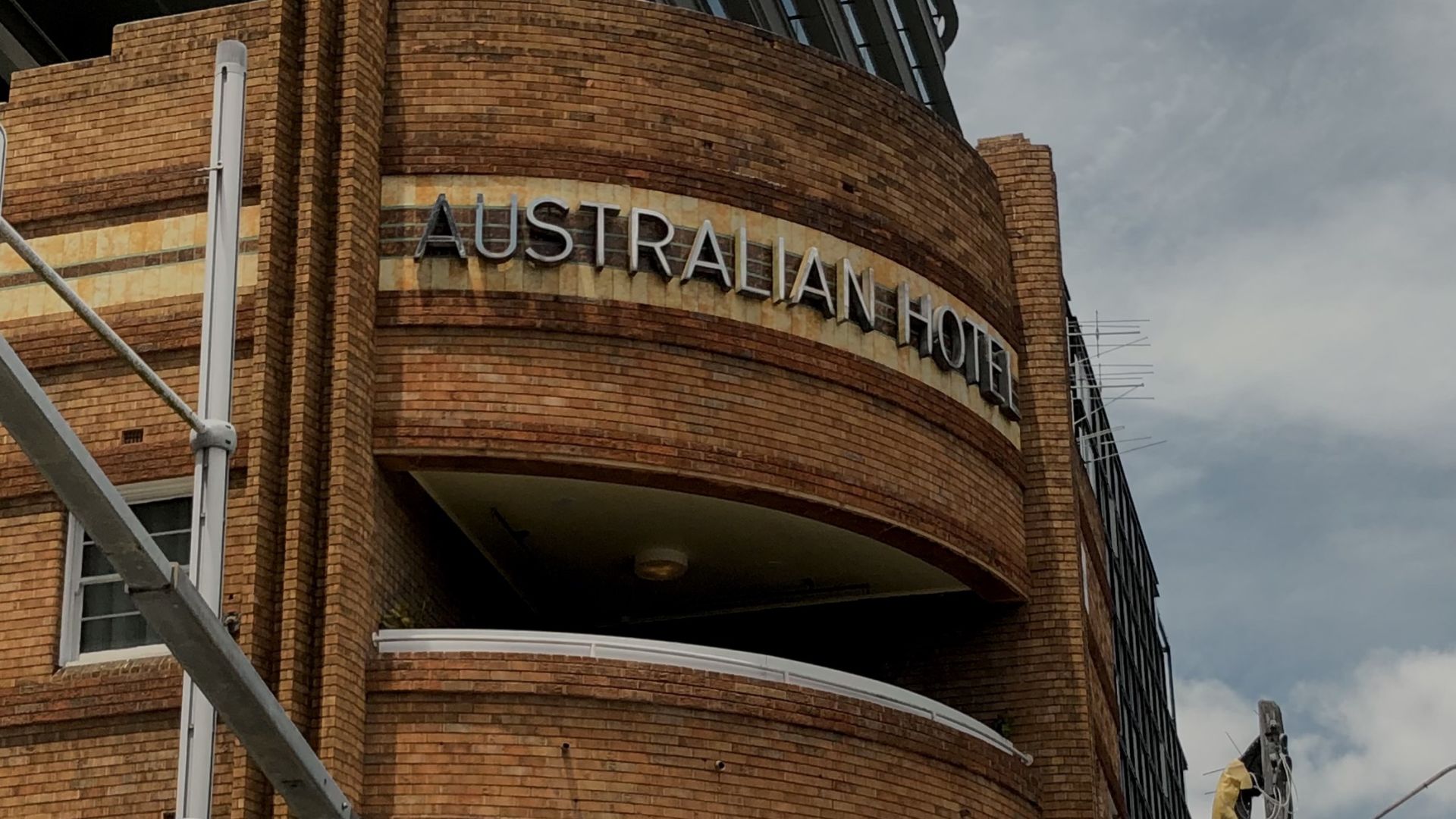Three years after lockout laws have lifted, The Abercrombie Hotel reprises its role as a central hub for Sydney’s nightlife. With a 24-hour licence and three newly renovated venues within the one hotel, The Abercrombie’s reopening is a small step away from Sydney’s sleepy reputation and a giant leap forward for our economy (... hopefully).
Much of the excitement around The Abercrombie can be linked back to its 180-year-long history. Open since 1843 as the Australian Inn, the art deco building closed for the first time in 2014, and was surrounded by the modern, towering luxury apartments built by the Central Park developers. Before its closure, the pub was a hot late-night spot with obligatory sticky floors and pumping live music. However, when Central Park bought out the property, doors were permanently shut. Two years later, it would be passed on to the Solotel Group, who vowed to continue on the hotel’s legacy and reopen.
The hotel’s closure came at a time when Sydney nightlife was straying into violent territory. Sydney’s reputation in the 90s knew no bounds, from raves in abandoned warehouses, to the drugs and clubs of Oxford Street and Kings Cross that weren't confined to the weekend. Then came the introduction of the RSA. The Responsible Service of Alcohol law was a swift dampener for party seekers. As the accessibility of booze was restricted, businesses pushed prices of drinks further upwards to compensate. Then came the sniffer dogs: a continuing controversy, this furry layer of law enforcement saw further restrictions on nightlife. The animals were commonly used to hunt down carriers of illicit substances, despite reports highlighting that sniffer dogs have since proven to be incredibly unreliable. Specifically, reports from 2006 showed that 74% of drug searches conducted as a result of sniffer dogs produced no illicit substances, and 84% of incidents that did find something were all in relation to very small amounts of cannabis. These factors alone, the RSA laws and the scaremongering sniffer dogs, were enough to stop Sydney nightlife dead in its tracks, but then came the harshest restrictions yet.
The final nail in the coffin was the establishment of our infamous lockout laws. Alcohol-related violence was a frequently discussed topic in 2014, and when two young men died in drunken incidents in the bustling Kings Cross, the government took it as a sign to crack down on Sydney nightlife. The laws required businesses to shut doors at 1:30am and call last drinks at 3am. Whilst there was a slight decrease in alcohol-related deaths and violence, the knock-on effect on Sydney’s nightlife would be palpable for years to come.
Group Entertainment Manager for the Solotel Group and self-proclaimed ‘club rat’, Mark Crollini, has seen the rise and fall of “sleepy Sydney” from both professional and personal sides. In an interview with UTS Vertigo, the entertainment manager explains that The Abercrombie’s legacy still lives on despite the seven-year closure. Throughout their long history, Crollini knows The Abercrombie for its “cult hit parties” thrown by organisations such as Purple Sneakers and S.A.S.H. The hotel’s cementation as a legendary Sydney nightlife venue is recognisable in the large number of legacy patrons who returned to the hotel for its 36-hour launch party. Despite the success of the event, however, the manager says it's hard to ignore the change in culture.
“It’s definitely gotten better with [the lockout laws] being repealed - which is great - but it hasn’t come back to that full sort of, swing, like it was.”
To be optimistic, The Abercrombie Hotel’s reopening signifies the government’s attempts to reinvigorate Sydney’s nightlife. Headed by Michael Rodrigues, the 24-hour Economy Commission is set on reimagining Sydney as a ‘truly global city’ with a ‘fantastic after-dark experience and 24-hour amenities for all to enjoy’. Crollini gives the five-point strategy high praise, stating that the commission has provided a lot of funding,” and that “they did support a lot of events on the tail end of COVID and really kind of gave a lot of confidence to get stuff back up and running.” However, like most governmental plans, there’s always room for improvement.
“There’s an information disparity where people don’t know what's going on,” Crollinie explains. ‘There is definitely a lot more they can do … the granting of liquor licences to pop up events, or freeing up public spaces for people to do cool events and really create something that’s different and not so heavily regulated… and I know there are people who are pushing for it on the inside.’
At the end of the day, Mark and many others believe it's only a matter of time before Sydney switches on again.
“The biggest part is, really, they can throw money at it, they can throw support, but the culture’s what's going to take time to build and I think that’s the biggest issue.”
So what does that mean for us new generation of clubrats, fiending for a venue that won’t become barren once the clock strikes 12? Mark tells us that we can “come to The Abercrombie for starters!” He urges us all to “support events – so many people are doing cool stuff and they take so many risks to put those shows on. They put up their own money, and they throw absolutely everything at it”.
Sydney’s nightlife may not be what it once was, but the reopening of The Abercrombie is a refreshing step in the right direction.


 -
-